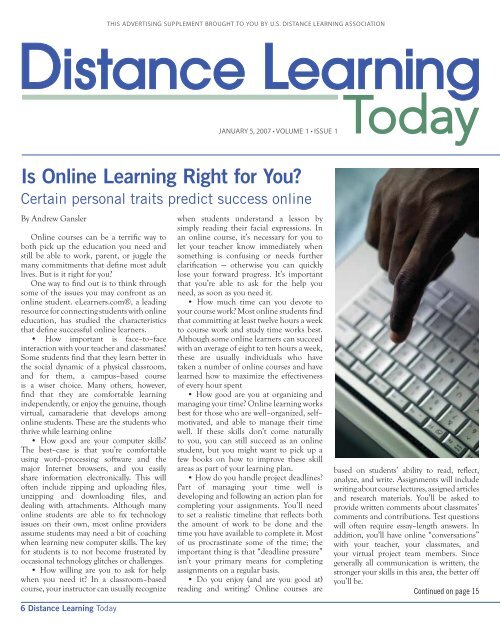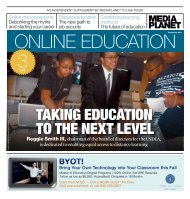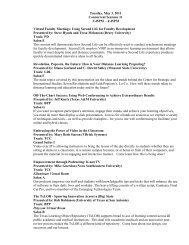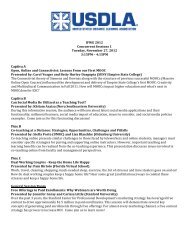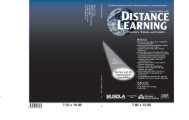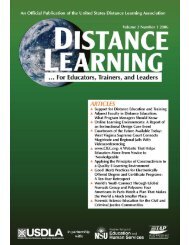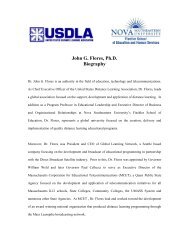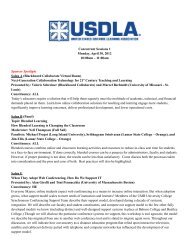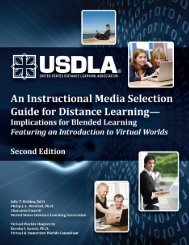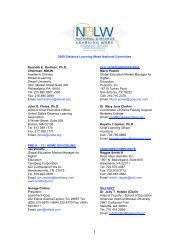Is Online Learning Right for You? - United States Distance Learning ...
Is Online Learning Right for You? - United States Distance Learning ...
Is Online Learning Right for You? - United States Distance Learning ...
You also want an ePaper? Increase the reach of your titles
YUMPU automatically turns print PDFs into web optimized ePapers that Google loves.
<strong>Is</strong> <strong>Online</strong> <strong>Learning</strong> <strong>Right</strong> <strong>for</strong> <strong>You</strong>?<br />
Certain personal traits predict success online<br />
By Andrew Gansler<br />
<strong>Online</strong> courses can be a terrific way to<br />
both pick up the education you need and<br />
still be able to work, parent, or juggle the<br />
many commitments that define most adult<br />
lives. But is it right <strong>for</strong> you?<br />
One way to find out is to think through<br />
some of the issues you may confront as an<br />
online student. eLearners.com®, a leading<br />
resource <strong>for</strong> connecting students with online<br />
education, has studied the characteristics<br />
that define successful online learners.<br />
• How important is face–to–face<br />
interaction with your teacher and classmates?<br />
Some students find that they learn better in<br />
the social dynamic of a physical classroom,<br />
and <strong>for</strong> them, a campus–based course<br />
is a wiser choice. Many others, however,<br />
find that they are com<strong>for</strong>table learning<br />
independently, or enjoy the genuine, though<br />
virtual, camaraderie that develops among<br />
online students. These are the students who<br />
thrive while learning online<br />
• How good are your computer skills?<br />
The best–case is that you’re com<strong>for</strong>table<br />
using word–processing software and the<br />
major Internet browsers, and you easily<br />
share in<strong>for</strong>mation electronically. This will<br />
often include zipping and uploading files,<br />
unzipping and downloading files, and<br />
dealing with attachments. Although many<br />
online students are able to fix technology<br />
issues on their own, most online providers<br />
assume students may need a bit of coaching<br />
when learning new computer skills. The key<br />
<strong>for</strong> students is to not become frustrated by<br />
occasional technology glitches or challenges.<br />
• How willing are you to ask <strong>for</strong> help<br />
when you need it? In a classroom–based<br />
course, your instructor can usually recognize<br />
6 <strong>Distance</strong> <strong>Learning</strong> Today<br />
THIS ADVERTISING SUPPLEMENT BROUGHT TO YOU BY U.S. DISTANCE LEARNING ASSOCIATION<br />
<strong>Distance</strong> <strong>Learning</strong><br />
Today<br />
JANUARY 5, 2007 • VOLUME 1 • ISSUE 1<br />
when students understand a lesson by<br />
simply reading their facial expressions. In<br />
an online course, it’s necessary <strong>for</strong> you to<br />
let your teacher know immediately when<br />
something is confusing or needs further<br />
clarification — otherwise you can quickly<br />
lose your <strong>for</strong>ward progress. It’s important<br />
that you’re able to ask <strong>for</strong> the help you<br />
need, as soon as you need it.<br />
• How much time can you devote to<br />
your course work? Most online students find<br />
that committing at least twelve hours a week<br />
to course work and study time works best.<br />
Although some online learners can succeed<br />
with an average of eight to ten hours a week,<br />
these are usually individuals who have<br />
taken a number of online courses and have<br />
learned how to maximize the effectiveness<br />
of every hour spent<br />
• How good are you at organizing and<br />
managing your time? <strong>Online</strong> learning works<br />
best <strong>for</strong> those who are well–organized, self–<br />
motivated, and able to manage their time<br />
well. If these skills don’t come naturally<br />
to you, you can still succeed as an online<br />
student, but you might want to pick up a<br />
few books on how to improve these skill<br />
areas as part of your learning plan.<br />
• How do you handle project deadlines?<br />
Part of managing your time well is<br />
developing and following an action plan <strong>for</strong><br />
completing your assignments. <strong>You</strong>’ll need<br />
to set a realistic timeline that reflects both<br />
the amount of work to be done and the<br />
time you have available to complete it. Most<br />
of us procrastinate some of the time; the<br />
important thing is that “deadline pressure”<br />
isn’t your primary means <strong>for</strong> completing<br />
assignments on a regular basis.<br />
• Do you enjoy (and are you good at)<br />
reading and writing? <strong>Online</strong> courses are<br />
based on students’ ability to read, reflect,<br />
analyze, and write. Assignments will include<br />
writing about course lectures, assigned articles<br />
and research materials. <strong>You</strong>’ll be asked to<br />
provide written comments about classmates’<br />
comments and contributions. Test questions<br />
will often require essay–length answers. In<br />
addition, you’ll have online “conversations”<br />
with your teacher, your classmates, and<br />
your virtual project team members. Since<br />
generally all communication is written, the<br />
stronger your skills in this area, the better off<br />
you’ll be.<br />
Continued on page 15
Moving Pictures... Continued from page 8 “Gradcast” Provides Troops Overseas <strong>Online</strong> <strong>Learning</strong>... Continued from page 6<br />
and multimedia content at the push of a<br />
button. Students have on — demand access<br />
to archived class lectures and supplemental<br />
in<strong>for</strong>mation <strong>for</strong> enhanced course<br />
understanding.<br />
“Digital video is playing a key role<br />
in shifting how students and faculty<br />
communicate with one another, access<br />
vital academic resources, and support<br />
an enriched learning environment,” said<br />
Marshall Allen, director, The OSU Institute<br />
<strong>for</strong> Teaching and <strong>Learning</strong> Excellence.<br />
with Front-Row Seats at Graduation<br />
Samuel Clemens High School is<br />
committedtoitsstudentsanditscommunity.<br />
Nearly one – third of the students attending<br />
the San Antonio — area school are from<br />
Randolph Air Force Base and Fort Sam<br />
Houston Army Base. School officials<br />
recorded and posted the graduation video<br />
online in May — making this important<br />
student achievement available to friends<br />
and family across the globe, including<br />
Afghanistan and Belgium.<br />
• Do you feel com<strong>for</strong>table voicing your<br />
opinion? While it’s possible to sit in the back<br />
of a traditional classroom and avoid active<br />
participation, online instructors expect you<br />
to contribute meaningful comments to the<br />
class discussion on a regular basis. Although<br />
this means that it’s a lot tougher to be<br />
invisible, many previously passive students<br />
discover the value of their own voices in the<br />
“anonymity” of an online classroom.<br />
• What are your expectations about<br />
online courses? A well–done online course<br />
can be fun, stimulating, engaging, and a great<br />
Removing <strong>Distance</strong> Hurdles from learning experience, but rarely is it going to<br />
Patient Examination “Instant Replays” <strong>Learning</strong><br />
be easier than a classroom — based course.<br />
Improve Medical Student Training<br />
Today’s wired society enables students While online instructors expect a high level of<br />
Medical schools continually update and teachers to obtain in<strong>for</strong>mation participation and lots of hard work from their<br />
their courses to teach the latest medical instantly — sidestepping traditional barriers students, they also tend to reciprocate with<br />
advances <strong>for</strong> diagnosing illnesses and of time and distance. As we <strong>for</strong>ge new global high levels of responsiveness and engagement.<br />
treating patients. Many medical schools are connections and always — on connectivity, These questions should serve as a good<br />
also incorporating technology to provide an digital video will trans<strong>for</strong>m how we learn, place to start when considering pursuing<br />
added dimension to traditional classroom work, and interact.<br />
online education. For a more personalized<br />
and training sessions. In Toronto, the Henry Ford’s legacy began with the assessment, you may want to check out<br />
University Health Network’s Paul B. Model T and grew as he applied new the eLearners Advisor (www.elearners.com/<br />
Helliwell Centre <strong>for</strong> Medical Education technology to drive broader innovation. advisor), which will give you comprehensive<br />
is expanding traditional classroom and Similarly, today’s educators and students results on whether online learning is right<br />
standardized (simulated) patient exams have the opportunity to use vast access to <strong>for</strong> you, including feedback and suggestions<br />
by enabling students to record, replay, data and global collaboration to redefine about how you can be more successful as an<br />
and critique these exams using video how we approach business, science, online student, access to resources to help<br />
on demand. These new digital video education and the other critical pillars of you, and assistance in finding an online<br />
applications provide additional methods<br />
of teaching students important nuances of<br />
modern society.<br />
degree that meets your needs.<br />
high–quality patient care.<br />
Michael Baker is the Chair Emeritus, USDLA as well<br />
as an education and healthcare consultant.<br />
Andrew Gansler is the CEO of eLearners.com., a<br />
leading search engine <strong>for</strong> locating and evaluating online<br />
courses and degrees.


